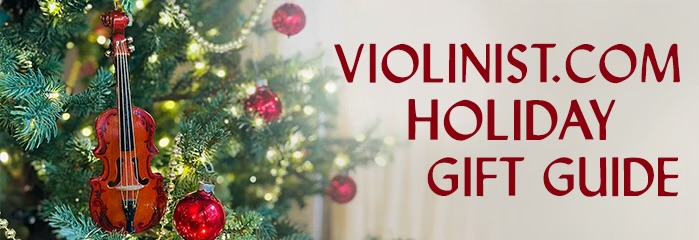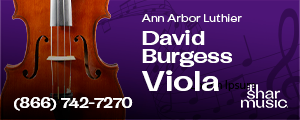
Goals
July 30, 2007 at 10:50 PM
I've been playing without a teacher for almost 9 months now. I'm reasonably pleased with what I've accomplished on my own, but it is time, or maybe past time, to take the next step.There were a number of reasons I didn't start out with a teacher right away, the most obvious one being lack of time and money, but there were others too: feeling ashamed that I hadn't played in so long, thinking that if it was a total disaster it would be better to have the disaster in the privacy of my own home.
But mostly, it was that I didn't know what I wanted to get out of lessons, didn't have a plan, didn't have goals. I didn't want to waste my time or a teacher's time. I might still be channelling Mr. Coppola, orchestra teacher of 5th graders at Forest Elementary School in Williamsville, NY, who told me one week that since I hadn't practiced enough that week, he wasn't going to give me a lesson. He wasn't going to give me "something for nothing." I was really upset by that. I remember that I cried that afternoon as I was walking home from school. But then, I always practiced enough, every week, after that.
So last night I sat down and wrote out two long lists.
List #1: Issues to Discuss with a Prospective Teacher
1. Playing both violin and viola. I need a teacher who does both instruments.
--how to balance the two? When to practice each instrument? Both in the same day? Alternate days, weeks?
--fiddle: Irish? Cape Breton? On viola?
--The prospect of learning or playing by ear still makes me uneasy. If I'm going to attempt learning or playing by ear, I don't need "rah-rah-you-can-do-it" type of encouragement, or anyone telling me that it's "easy." Instead, I need someone who'll be sympathetic to the fact that I find it difficult and scary.
--buying a new violin
2. Playing viola in an orchestra
--Arlington Symphony (community orchestra--don't need to audition, website says they welcome new string players)
--Longwood Symphony Orchestra in 2008? (serious semi-pro orchestra). Originally wanted to try out this fall but now am not so sure. Getting cold feet about the audition. And, probably too serious of a commitment, even if by some miracle I did make it, given that my boss is going on sabbatical and my close coworker on maternity leave at the same time and I'm probably going to get buried by work for a few months starting in September.
Both rehearse 1X/week on Wednesday nights and have seasonal concerts.
--Orchestral excerpts on viola. Can I work on preparing some? What are some good ones? I have a list of excerpts required if I wanted to audition as a viola section player for a major orchestra in Cincinnati (posted on the web). Would that be a good start?
--What if the orchestra needs violins more than it needs violas?
3. Practicing
--How to use 1/2 to 1 hour per day most efficiently. Finding more practice time.
--Simon Fischer's Basics. I just bought it. Written for violin, adapt for viola?
--Urstudien? (on viola)
--Scales. Boring, boring, boring. I'd rather do Urstudien. Or Wohlfahrt. Or almost anything. Too many repetitions of a scale and I start not noticing--just not hearing--if it's out of tune.
--Preferred use of Musician's Practice Planner at lessons rather than the ubiquitous and semi-useless music manuscript book that teachers have always made me bring in the past.
--Goal setting
4. Specific areas of my playing that need improvement and/or attitude adjustment on my part:
--Vibrato on both instruments. Especially "continuous" vibrato.
--Left thumb slightly too short due to childhood accident. Tends to lag while shifting. Needs some attention.
--Ear training. Learning fiddle tunes or other by ear.
--Listening to and learning to like modern, less accessible, music: e.g. Clarke, Hindemith, Walton.
--Playing in higher positions (above 5th)
5. Violinist.com and blog.
--Recording equipment?
--posting my audio?
--would teacher mind if I posted about my lessons or about things that I was having trouble with?
6. Performance
--church
--busking
--Good unaccompanied pieces, fake book, viola arrangements of violin pieces
--chamber music? Meeting people, can teacher introduce me?
List #2: Music I want to learn to play on viola:
1. Bach cello suites:
--Refine #1, memorize?
--Learn #2
2. Bruch Romanze, esp. for vibrato (as discussed by Mendy in her blog)
3. Anton Stamitz (not Karl) Concerto No. 4 in D
4. Rebecca Clarke Passacaglia on an Old English Tune and Lullaby
5. Benda Grave
6. Handel-Halvorsen Passacaglia (both parts?)
7. Vieuxtemps Capriccio for viola
http://youtube.com/watch?v=0b5Ex2CgSPI
8. Martinu Rhapsody (recommended by Yixi)
9. Fiddle and Busking tunes
--Shenandoah like Mairead Nesbitt (as discussed by Albert and Pauline)
--2 Maud Powell arrangements of other spirituals (as recommended in Rachel Barton Pine's blog and posted--gorgeous)
--Come back to Sorrento (as recommended by the older gentleman at the Farmer's Market; it's in the Classical Fake Book, which I bought thanks to Pauline)
--Dark of Winter (UU hymn, to arrange myself by next Xmas to play in church)
***
Teachers: if a prospective student brought you these lists for discussion, would you like that, or would you run screaming?
Posted on July 30, 2007 at 11:14 PM
I'd be thrilled to have a student who thinks so much like myself :)
Think about what a bright light you'd be in the teacher's day in between all the kids being dragged to the lesson, or having fun in their lesson at the expense of the teacher since they haven't practiced.
The one big question would be....
Can you find more time than 1/2 to 1 hr. a day to practice? Otherwise, there isn't enough time to get to enough.
I emailed a similar kind of list (though more conversational) to my teacher, spread out...anyhow..
in general, she talks a lot about how I spread myself too thin. Take on too much. I'd add, think about too much, thus, lessening productive time.
There is nothing wrong with sending a teacher a letter like this. THey will help you narrow it down and focus on the most important of the mentioned issues. That is partly what teachers are there for.
Hope that is useful,
Sincerely,
Jennifer Warren
Posted on July 31, 2007 at 12:03 AM
I personally would not run screaming if a prospective student gave me a list like this. I would say, "Well, gee, there are a lot of VIOLA goals on this list." (Insert smiley face here).
So if your finances, and time to practice, are limited, then why not consider focusing on viola? The money not spent on a violin upgrade could go for a lot of viola lessons, music, supplies, etc.
Posted on July 31, 2007 at 1:41 AM
Handel Sonata VI (largo)
http://video.google.com/videoplay?docid=-1679036930102564193&q=violin&hl=en
cheers
Posted on July 31, 2007 at 1:44 AM
Posted on July 31, 2007 at 2:43 AM
It's true, though, I think what I'm most drawn to on the violin right now is fiddle, which is a really different animal from classical violin (or viola). I mean, on the violin I have no real interest in trying to learn big Romantic concertos or Paganini caprices or that sort of thing. And I can already play a reasonably good Bach double, so that's not really where I need a teacher. So I might be able to compartmentalize and put one or the other group of skills--probably fiddle--off until later (like when the kids are older or when I retire from my day job--ha).
Posted on July 31, 2007 at 3:28 AM
So irregardless if your goals are reasonable or not, they serve to keep you growing.
With a list like this, I'd have all my elements on a wall somewhere (shifting, bowing techniques, vibrato, d-stops), and see where I had over projected myself if that is the case, so that I could adjust my program along the way.
But you are further along than I, I think and you may have your basics ingrained, so maybe they are just reasonable goals?
My days consist of making sure like twelve little things are in place just doing etudes and adding a little bit to Suzuki each day--of course along with other things (staccato, martele, bow pressure/speed, yada yada) of course.
Is my thumb relaxed?
My neck?
How's my tuck?
Left hand shaped?
Left wrist straight?
Playing from center?
Good SP control?
Fortunately for me now, I can answer yes to most questions consistently now, but routinely have to tweak this or that.
The point being, even though I have a goal to get through Suzuki 4 by spring, I have to work on all the above at the same time.
So, I cheat and mess around with Fiocco or freestyle a little here and there, but to have a list like that would only be a dream for me.
I think, you being intelligent and having candoitiveness, you can probably answer your own question here? But I wanted to give you some feedback on how I wrestle with my goals. If I got distracted when I fail, I'd have given up a long time ago--so I set more goals and keep plugging along.
Finally, it is paying off a little.
Posted on July 31, 2007 at 4:40 AM
I hear you leaning towards folk music. There are methods to learning by ear which can be taught. Some require just a bit of theory. Listening over and over and over is a big help, too. Play CDs or mp3s while you're driving, fixing dinner, etc. Learning to improvise by ear is very important and also a lot of fun. Again, knowledge of a little knowledge of theory goes a long way. Doing it over and over is the best way to learn.
I currently have a student who was trained as a classical violist and now wants to play fiddle music on her viola with other people. We started with printed music, tried all kinds of combinations of me on fiddle and her on viola, and we both learned a lot. One important thing that I learned is that I love it. Now I'm playing a lot of melodies while she tries improvising in a nonthreatening situation (with me), and I give her pointers. She also tries improvising with recordings at home a lot. I think she's good enough to start jamming now, but she doesn't feel comfortable with it yet, so I don't push her. I've begun to look for and meet other people who play folk viola. They're all happy to give guidance. It's been a very fun, rewarding experience for both my viola student and me.
Posted on July 31, 2007 at 1:38 PM
Posted on July 31, 2007 at 2:13 PM
Posted on July 31, 2007 at 2:30 PM
My grandmother's death in February started me thinking about how life is short and how there's no time like the present to do what I want to do (which is all that stuff--2 instruments, an orchestra, chamber music, busking, and so forth). Aside from the thumb which I think is manageable, I don't have any injuries or pain or anything like that, and I can still essentially play as well as I ever could, maybe better because I don't get as nervous. So I'm just feeling like, if not now, when? By the time I'm retired my fingers might not be as nimble . . .
Posted on July 31, 2007 at 5:07 PM
Posted on July 31, 2007 at 6:22 PM
1. Finding a teacher who can help with everything on the list---I suppose it's conceivable that you *might* find such a person, but I would be very surprised if you did. Now, a fine *viola* teacher, I'd say the odds of that are much better.
2. Focus on viola---have to agree. You like your viola. You like the music. Go for it.
3. *listening* to fiddle music---agree also, it's the best way to get it into your head and the first step in learning by ear. Buy cd's. Go to concerts. Find programs on the radio.
4. More practice time---but you know that already
Finally, my own thought, not speaking as a teacher, but just in general---the thing that would worry me about a list this expansive is trying to do everything and never getting good at any one thing. Take fiddling, for instance---most people need to do that exclusively for several years before they really get the hang of it. But I'm the kind of person who likes to get to know a thing inside-out, that's when I feel I can be most creative. Maybe you're different---knowing a little in many different areas makes you happy. If so, then go ahead and try for everything. If not, however, pick one thing and work toward accomplishing that. Maybe try the community orchestra first and if that's successful and you like it, start thinking about the Longwood orchestra.
Posted on August 1, 2007 at 7:00 AM
It’s a very ambitious list and certainly get me thinking: "Hmmm, I hope she’d narrow down the scope so that the new teacher will have something manageable to start working with." Here are some of my initial thoughts and comments:
In terms of practice,
a)I find the most efficient ways are:
a. slow practice, slow practice! (I had to have my teacher show me what it really means and what result to look for when I practice slowly).
b.Isolate issues and work 15 min on each and keep rotating.
c. Get teacher’s feedback in as a shorter period as possible (1/2hr/week is better than 1hr/2 wks). Okay, it’s not really about practice but it indirectly affects it by shortening the time for repeating something wrongly.
b)Scales: Like you, I find scale really boring but I also know that this is because I don’t know how to practice it. So one of my top priorities with my current teacher when we started was for me to learn how to do it properly. A couple of months later, I now love scales and arpeggios – they are anything but boring! You learn not just intonation, but shift, rhythm, bowing techniques, tone, etc. Just about anything you are working on will show up in your scales and arpeggios for you to see what issues need immediate attention. And the result is also more obvious because, for one thing, you unlikely to be distracted by the melodic aspect of playing.
In terms of memory, I’m a big fan of memorize everything I’m working on, from scales, etudes to pieces. Since I’m working on chunks each time, it’s not so hard for me to memorize them bits by bits. The benefit is enormous because once the stuff is in your head, you can just close your eyes and completely focus on the sound and the sensations of your body when you are practicing. Or you can pay close attention on where your bow is on the strings, how your fingers move during vibrato, how your posture looks in the mirror, and how your bow arm and hand move, etc.
Finally, do you have a timeline for at least some of the goals you are trying to reach? Is there a phased process for each major issues you can somehow map out at this stage?
Posted on August 1, 2007 at 10:32 AM
This entry has been archived and is no longer accepting comments.
Violinist.com is made possible by...
Violinist.com Holiday Gift Guide
Dimitri Musafia, Master Maker of Violin and Viola Cases
International Violin Competition of Indianapolis
Johnson String Instrument/Carriage House Violins
Subscribe
Laurie's Books
Discover the best of Violinist.com in these collections of editor Laurie Niles' exclusive interviews.

Violinist.com Interviews Volume 1, with introduction by Hilary Hahn

Violinist.com Interviews Volume 2, with introduction by Rachel Barton Pine






